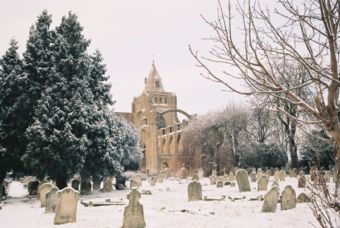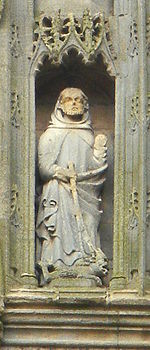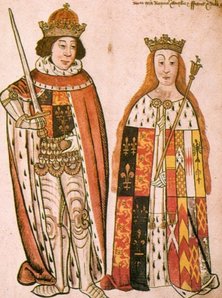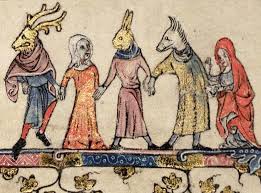usually in the first week of December it has its Christmas Craft and Food Fare when mince pies are eaten and maybe a
drink of mulled wine is sampled. On the 6th December in 1484, the second Christmas of King Richard III's reign and just
like today people celebrated, for this day was St Nicholas's saints day.
On that day, our ancestors believed this Saint Nicholas brought gifts such as nuts, fruits and marzipan sweets, and with
these gifts the ability to foretell the events of the following year. While most of the Fenland community where knocking back the Christmas ale, Crowland Abbey was not so festive. Within the abbey the monks were busy with local and national
affairs, on one hand they were trying to keep talk of a local dispute quiet and on the other being quite vocal in its criticism
of Christmas in the court of King Richard III.
Christmas parties. The writer of the famous Croyland Chronicle states that he was unable to account for many of the
activities in the court at this time “because it is shameful to speak of them” even Queen Anne and Elizabeth of York were considered "vain" because they had more than one party outfit. Richards best buddy, Bishop Thomas Langton, joined these medieval party poopers by stating "sensual pleasure holds sway to an increasing extent.’
What on earth did this mean?
Did Richard kiss the lovely Ann more than once under the misletoe I wonder?
Not one of the writers made any attempt to elaborate on any of the events they were writing about.
as a "good, learned, serious and virtuous man" while also pointing out that he had called his brothers court "licentious and
morally corrupt." The University of Leicester School of Historical Studies quite rightly pointed out that compared with the
wild parties that were held at Rome during the reign of Pope Alexander VI, the English court under Edward IV and
Richard III was a 'model of virtue.’
Surely, even the pious, like Richard, should not be frowned upon for having a good time, obviously there was more to these statements than meets the eye.
Perhaps these people were just a tad miffed and just bit disgruntled at not to being invited. Did they watch from a
distance or listen enviously to tales told the following morning of how Catesby, Lovell and Ratcliffe danced in silly animal
party hats or King Richard drank way too ale and threw iced cakes at the clergy.
king wished to hear, words that would keep them safe in the new Tudor era. History suggests that the events at court in
1484, as written in the Croyland Chronicles, were written two years later in 1486, by someone who was educated in law and who was privy to information within the court.
The Benedictine residents of Crowland Abbey had at their head one Lambert Fossdyke who had been Abbot at Crowland
since January 1484 and who was a Bachelor of Law and it was such a man with a degree in law who was considered to be
the writer of these malicious rumors about Richard III.
John Russell, Bishop of Lincoln, is commonly thought to be the author but it could just as well have been Fossdyke dictating
to one of his monks?




 RSS Feed
RSS Feed
